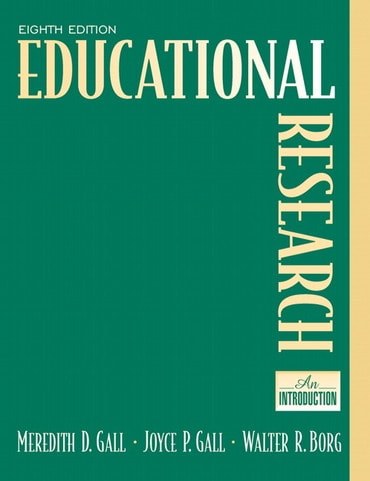
Educational Research: An Introduction, 8th edition
- M D. Gall |
- Joyce P. Gall |
- Walter R. Borg |
Title overview
- The book's 18 chapters provide thorough coverage of concepts, methods, and issues found in the practice and literature of educational research.
- Research techniques are described in depth to assist students in designing a sound masters or doctoral study that will stand up to critical scrutiny.
- Published research studies covering a wide range of educational topics are used throughout the book to illustrate important concepts and procedures.
- Each new research term introduced in a chapter is boldfaced and defined. All such terms are also defined in the book's glossary.
- “Touchstones in Research” are placed in the margins of each chapter to conveniently guide the reader to books, articles, and other sources that provide additional discussion of important topics.
- A list of recommendations for applying chapter concepts and techniques to the design and conduct of a study is located at the end of each chapter (except Ch. 1).
- Each chapter concludes with a self-check test to help readers assess their understanding of the concepts and procedures that it covers. An answer key is provided at the end of the book.
- A revised "Proposal Writing Guidebook" to help graduate students in the critical planning stages of a research study is available with this book.
- An online instructors manual, which includes guidelines for course design, a file of closed-form and open-form test items keyed to the chapter objectives, application problems, and teaching activities.
- New or revised sections on important topics such as hierarchical linear modeling, mixed methods research, the increasingly diverse range of genres and emphasis on justice-seeking perspectives in qualitative research, policies for protection of human subjects, the establishment of the Institute of Education Sciences, and changes in the ERIC system.
- Illustration of research concepts and procedures by describing their use in recently published studies on such contemporary educational problems as the achievement gap, diversity in education, curriculum standards, and school accountability.
- All citations checked and updated to reflect new book editions and authoritative recent publications on key topics.
- Reorganization of selected chapters to improve topic organization and comprehension.
Table of contents
I. INTRODUCTION.
1. The Nature of Educational Research
II. PLANNING A RESEARCH STUDY.
2. The Research Process: From Proposal to Final Report
3. Ethics and Site Relations
4. Reviewing the Literature
III. RESEARCH METHODS.
5. Statistical Techniques
6. Selecting a Sample
7. Collecting Research Data with Tests and Self-Report Measures
8. Collecting Research Data with Questionnaires and Interviews
9. Collecting Research Data through Observation and Content Analysis
IV. QUANTITATIVE RESEARCH DESIGN.
10. Nonexperimental Research: Descriptive and Causal-Comparative Designs
11. Nonexperimental Research: Correlational Designs
12. Experiment Research: Designs, Part 1
13. Experimental Research: Designs, Part 2
V. APPROACHES TO QUALITATIVE RESEARCH.
14. Case Study Research
15. Qualitative Research Traditions
16. Historical Research
VI. APPLICATIONS OF RESEARCH.
17. Evaluation Research
18. Action Research